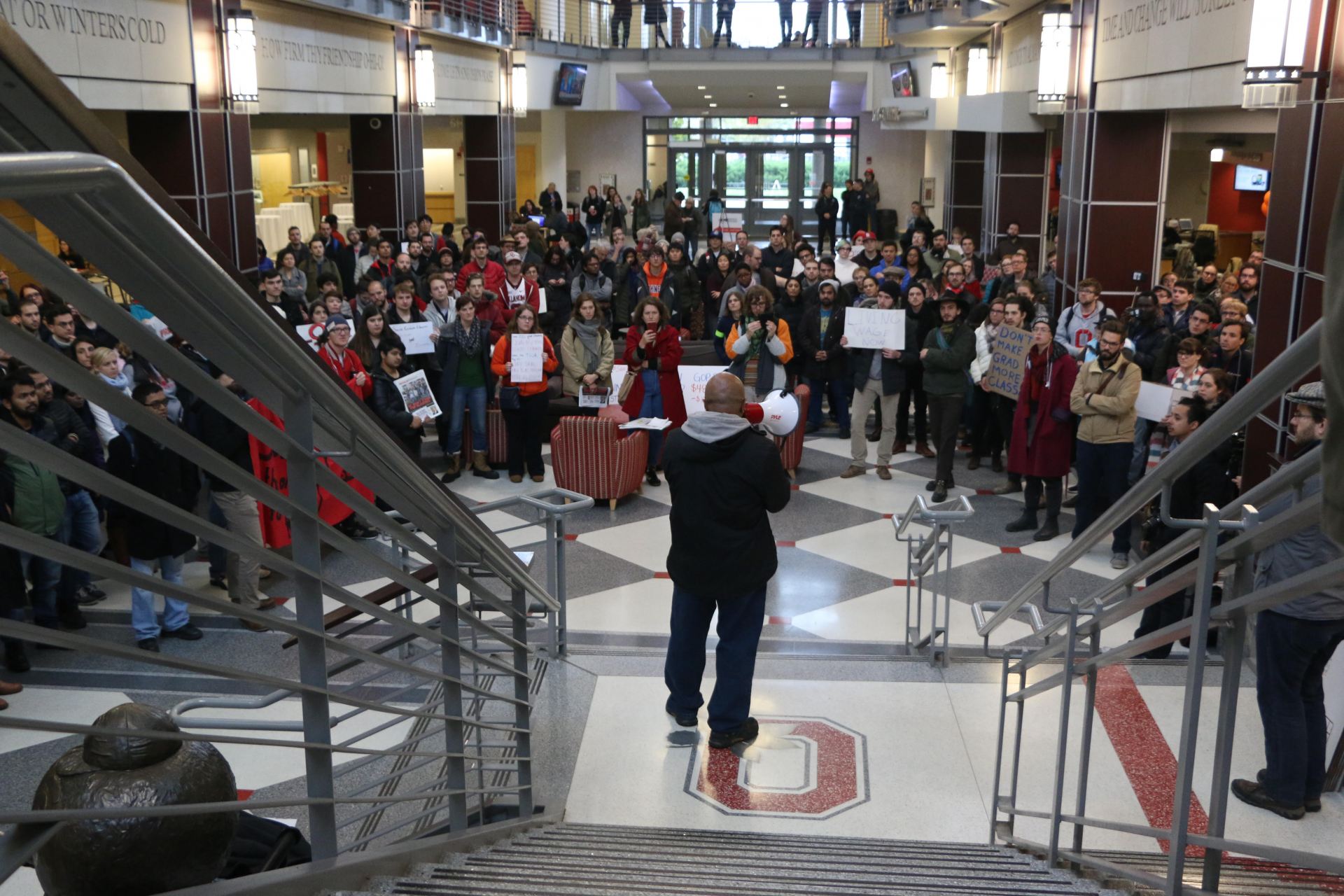
Pranav Jani, an associate professor of English, speaks to a crowd of about 100 protestors at the Ohio Union Monday. They gathered to voice their opposition to Congressional Republicans’ tax bill, which contains a provision that would make graduate students’ tuition waivers taxable income. Credit: Kevin Stankiewicz | Editor in Chief
A group of 20 graduate students from the John Glenn College of Public Affairs sent a letter to the Ohio Congressional Delegation on Wednesday, outlining their opposition to parts of the tax proposal that will go to the House floor for a vote on Thursday.
The students, who each provided personal anecdotes in the letter, were specifically opposing Section 1204 of House Resolution 1, which would make graduate school tuition waivers taxable, increasing the amount students would pay in taxes.
“Making graduate education unaffordable through this tax increase would seriously degrade
the capacity of graduate students to continue their contributions to the advancement of
American students, innovation and the economy,” the letter said. “Discouraging graduate studies would dampen business innovation, national economic competitiveness and social equity.”
Stephanie Casey Pierce, a third-year doctoral student in public policy and management wrote to the Ohio delegation about her experience returning to school after 10 years working in public policy, and said that with two kids she never would have returned to school without the tuition waivers.
“When I decided to return to school, I had two small children in full-time care. I left a good paying job to pursue my degree because I feel that the benefit of this degree will pay off over time,” Pierce wrote. “However, I would not have returned to school had I not had the benefit of a tuition waiver from OSU. I would not have returned had it been necessary for me to take out loans to do so.”
The students outlined in their letter the predicted $3,000-4,000 tax increase and how it would make being a graduate student “untenable.”
Aiden Irish, a second-year doctoral student in local governance, food systems and agriculture policy, recalled memories of the small farms he grew up around that eventually succumb to economic downturns. He said these forces pushed him to pursue a degree in public policy so he could work to save the small farms of the future.
“However, if Section 1204 passes, these plans will remain just that; plans. While my
background provides me with ample motivation to pursue my work, it did not provide me with
the financial resources to do it alone,” Irish said. “The tax burden that this legislation would bring would render my stipend unlivable, forcing me to abandon my plans to teach, to research, and to contribute my part to more equitable policies.”
The tax proposal will officially come to the floor for voting on Thursday, and while there are still a lot of moving parts, the graduate students were vehement in their statement that the policy would make their education hard to sustain.
RosaLia Stadler, a master’s student in public administration, recalled accepting admission to Ohio State, her “dream” graduate school. She said she had no funding assistance, but received a position as a graduate administrative assistant within the Office of Diversity and Inclusion.
“I will never forget the feeling of receiving that email and instantly bursting into tears. This position pays my tuition and offers me a monthly living stipend which I use to pay my rent, purchase groceries and other necessary items,” Stadler wrote. “However, my current financial situation does not allow me to save much money. Thus, if this legislation were adopted and I had to begin paying taxes on the tuition (which students like myself do not even touch), I would have to greatly reconsider my decision to be in a graduate program.”


